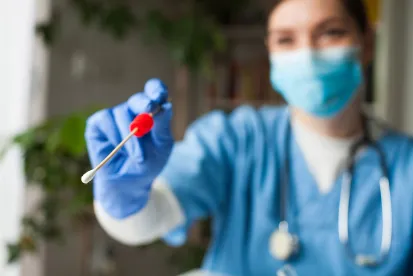The U.S. Department of Transportation (DOT) published new regulations in the Federal Register on May 2, 2023 that will allow covered employers to use oral fluid testing for drugs. While the new rules technically become effective on June 1, 2023, employers may not conduct oral fluid testing until the U.S. Department of Health and Human Services (DHHS) certifies at least two laboratories to conduct such testing (one to serve as a primary laboratory and one to serve as a split-specimen laboratory).
DOT-regulated employers should start planning now for the use of oral fluid drug testing once it becomes available. Among other things:
-
Employers will have to revise their written drug and alcohol testing policies, if the policy specifically states that urine is the only specimen authorized for drug testing. Policies will need to be updated to read “urine and/or oral fluid.”
-
If the employer authorizes oral fluid testing, the policy will need to state the testing events (e.g., pre-employment, reasonable suspicion/cause, post-accident, random, return-to-duty, follow-up) for which an oral fluid collection will occur. An employer can use one or the other, but not both, at the beginning of the testing event. However, if there is a problem in the collection that necessitates a second collection (e.g., insufficient quantity of urine, temperature out of range, or insufficient saliva), then a different specimen type could be chosen by the employer (i.e., through a standing order or a discussion with the collector) or its service agent (i.e., if there is no standing order and the service agent cannot contact the DER [designated employer representative]) to complete the collection process for the testing event.
-
Similarly, the policy will need to state whether oral fluid collections will be authorized for shy bladder situations and direct observation collections.
-
Oral fluid collections must be available for directly observed collections for transgender and nonbinary individuals.
-
Employees do not have the option to choose the testing methodology.
-
Employers must ensure that they have a business relationship with oral fluid collectors and labs, whether directly or through service agents.
-
Employers should have a standing order in place with each collection site, so that they know what kind of collection the employer wants performed (urine or oral fluid) and when.
-
Employers will need to use DHHS-certified laboratories for oral fluid testing. Point-of-collection testing or instant tests are not authorized.
-
DERs are required to be available to collectors 24-7, but that is especially important now to ensure that collectors are carrying out the employer’s standing orders as well as other issues that may come up.
-
It has always been the employer’s responsibility to determine when a refusal has occurred at the collection site. A collector may advise that something appears to be a refusal, but the final determination is the employer’s.




 />i
/>i

